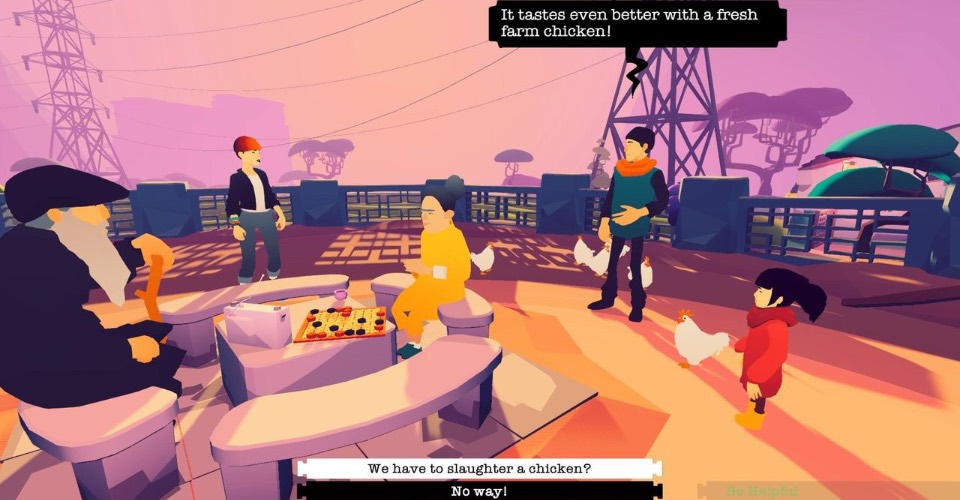Family is a big deal in Chinese culture and it’s the overriding theme in Road to Guangdong, an indie game set in the titular province in Southern China during the 1990s with a charming and vibrant lo-fi aesthetic.
One peculiarity of the Chinese language I grappled with from a young age was how virtually every family member is addressed differently; there’s not just a word for your aunt, but from which side of your parents and whether they’re the older or younger sibling, and this often matters more than their actual names – I never even learned a lot of my older relatives’ real names.
Fortunately in Road to Guangdong you at least know your name. You play as Sunny, a young art graduate who sets out on a road trip through the province to reunite with relatives in a bid to acquire family recipes that can help save her newly inherited restaurant. To do this, she’s also inherited her late father’s car nicknamed Sandy, and has her aunt, Guu Ma (i.e. her father’s oldest sister), along for the ride to support, or at times badger and criticise.
Sandy is very much like a character, and just as cantankerous as your Guu Ma – an old hunk of junk that’s barely in a fit condition to drive when you first take her out of the garage. To keep your ride sustained over the course of the journey, you’ll not only need to keep her topped up on oil and petrol, but also do regular maintenance fixing up or replacing parts. The better condition you can get Sandy in, the more efficient she is with oil and petrol, though it’s also on you not to get her more banged up, such as from driving too fast and wearing down the coolant system.

The premise is similar to Jalopy, another title from publisher Excalibur Games, albeit with much more basic mechanics. While you’re warned that your game will be over if you run out of funds and petrol, this isn’t really all that challenging, as I found myself with ample resources to spare for most of the game. In one instance near the end of my run where I forgot to pick up some spare petrol, I still had funds to call a tow truck to get us to the nearest garage.
Between destinations, you’ll only pass by two kinds of stops: a garage for your refueling, parts and repair needs (though aside from the engine, you can actually do most repairs yourself to save labour costs), or scrap yards where you have free rein to loot whatever parts your inventory space can take. Even if you don’t find anything that can improve Sandy, you can still sell these parts for extra dough.
The drives themselves are fairly tedious affairs, with routes generated as a straight line with a lot of the same basic assets, not to mention you have to drive fairly slowly because of Sandy’s condition. You do at least get some interesting music, including a radio station that plays traditional Chinese tunes and another that has more Western sounds like rock and techno on rotation.

What ultimately makes Road to Guangdong compelling to play is when you’re out of your car and meeting with your many relatives who, like Guu Ma, are also mostly referred to by specific terms. Even with your younger cousin, Sunny is referred to as ‘Che Che’ – big sister. It’s also refreshing that the theme of familial bonds isn’t strictly bound by blood, as you help an uncle deal with the revelation that they were adopted or learn of a certain man in Guu Ma’s life. The more you learn about Guu Ma, whose actual name is Grace, the more you feel for this woman who’s sacrificed so much in the face of patriarchal customs.
I found each of these narrative episodes compelling to experience, particularly with how it sprinkles in authentic Cantonese terms and expressions that I was certainly familiar with, and this also extends to the recipes you’re trying to get from your extended family members. It’s worth noting that these aren’t actually secret family recipes, but well-known Cantonese dishes that you’d find in a dim sum menu.
The narrative puzzles for each are fairly straightforward, though it’s still possible to mess up so that a family member refuses to give you a recipe or won’t come to the family’s next Spring Festival. While that might give a reason to replay, there’s less incentive from the overall lack of challenge or interesting mechanics, especially when the repetition and rehashed material is already apparent on the first go, such as Guu Ma’s nice but limited car anecdotes. Even if you only make the trip once, there’s a good time getting to know the Tong family.

